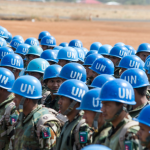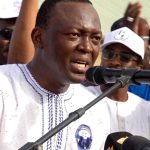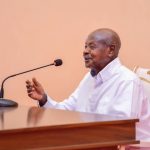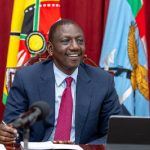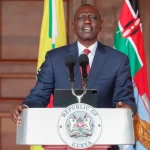By Kintu Moses
Following the meeting with the leadership of the business community (KACITA, FUTA, etc.), at State House Entebbe on April 17, 2024, the head of State H.E Yoweri Museveni halted other national duties to address the alleged plight of the traders facing resulting from the alleged high taxes and implementation of the Electronic Fiscal Invoice Solution. (EFRIS).
With President Museveni’s faith in the socio-economic transformation of Uganda based on the indigenous business people, he found it significant to extend his thoughts to the majority of the business community in the meeting held recently at Kololo Independence grounds on May 7, 2024.

Despite the urgent national concerns, the Head of State scheduled adequate time to engage the Business community. He listened to the uproar presented by the business leaders irrespective of the multi-insulting statements, “Watandika ddi okunyigiriza abanaku?” literally translated as“When did you start to suppress the poor” made by Mr. Isa Ssekito and his colleagues sharing the leadership of the business community.
The faces of the traders, some were startled on hearing a likely of such verbal attacks on the person of the President, while others hailed their strong matches boldness. This was a golden opportunity for them to cleanse their reputation following doubting debates regarding their relations with those who thought to suppress the traders.

Applying his all-time rebel abilities (Luwero methods), the old man absorbed all the said keeping sober and penning it down. The agents of the President (Ministers, URA officials, and others) were almost told off taking the microphone due to the circumstances of anger the traders held against them. The Minister for Kampala Hon. Minsa Kabanda in charge of the traders’ trade hub Kampala-Metropolitan area, almost fainted due to the nuclear verbal attacks from the wild traders.
In his address, he (the President) thoroughly explained to the traders the Taxation Policy in the best language they could understand. He emphasized the need for patriotism to achieve the socio-economic transformation agenda which the opposition leadership is failing by purposely misinforming the peasant traders about how the government is not for their greater good and intends to see them off their businesses in favor of the foreigners.
Using facts, Ssabalwanyi demystified the falsehood by outlining some of the 350 domestic companies and their proprietors benefiting from the government support to local traders at Namanve. The crowd was shocked to learn the truth despite expressing the thirst to hear the President directing a rise on the threshold of Value Added Tax to traders with a turnover of Ugx 1 billion, banning EFRIS, reducing the USD 3.5 levied per kilogram on imported textiles.
It is rare for a leader to take responsibility to ensure that the stakeholders in the business chain understand their role in the journey to achieve socio-economic transformation. I saw a Museveni re-playing his youthful days of leadership after a successful liberation war in 1986, by holding a chalk to teach his subordinates about the objectives of the Movement.
The day before the historical traders meeting with the Head of State at Kololo, the Parliament of Uganda had just debated the Taxes and maintained the status of the Value Added Tax threshold for those with an annual turnover of Ugx 150 million and levies on various imports including textiles. President Museveni’s objective for the meeting was to sow seeds of Patriotism and Pan-Africanism in the capitalistic traders to join him in the war to cease Uganda’s dependence on neo-colonialist imports.
Uganda imports 278 million meters of textiles annually spending USD 880 million with the indigenous Nytile producing only 25 million meters. If Uganda concentrated on the import substitution of only textiles, more than 11 factories at the capacity of Nytile would be established availing over 20,000 jobs for the Bazzukulu.
The argument from the traders on the matter of textiles would be about the government to first establish the 11 factories and then levy high taxes or even ban the importation of textiles. In the capitalistic world, business people do not care about the objectives of the state but only their profits. Our traders are not bothered about the 20,000 jobs offered to the foreigners and yet would benefit their sons and daughters here in Uganda with the necessary skills and knowledge.
The questions we need to ask ourselves should be; why do we refuse to accept what countries like China and Turkey did to take off their economies? Why should we continue to believe that our cotton must be exported in raw material form to Europe and elsewhere after buying finished products from cotton? Are we stakeholders in Uganda and if so, what is our sacrifice to have a developed Uganda?
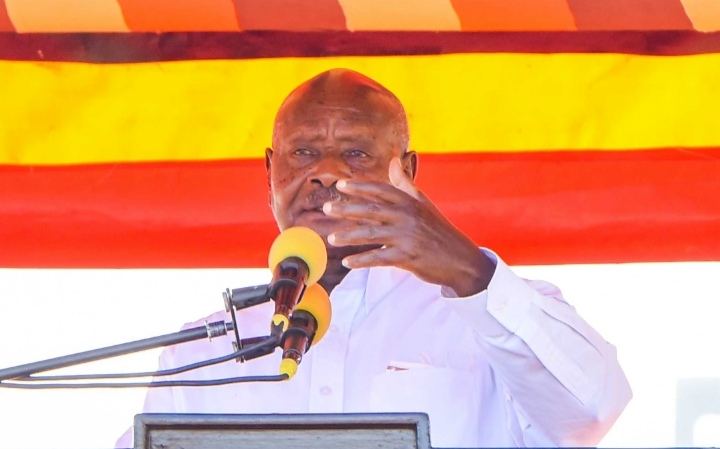
The Bazzukulu generation must start to own the transition by boldly exchanging views about the urgent need for the socio-economic transformation of Uganda. To achieve this objective, there are sacrifices that we must make as the citizens of this country. The Buy Uganda Build Uganda policy (BUBU) seems to have lost sustainable support for acceptance by Ugandans. This conflict should be a spark for the revival of Uganda’s economy from its import dependence burden. Imagine if we had prolonged COVID-19 for about 10 years! What would have settled our demand with reduced or no cross-border trading? Growing our local industrial strength is the correct path to establishing a sustainable socio-economy.
However, the President had the opportunity to note that the Uganda Revenue Authority ceased to support the peasant traders after the transfer of Ms. Allen Kagina to the Uganda National Roads Authority (UNRA). How can you have a system that measures textiles in Kilograms? Do our consumers buy clothes based on their heaviness? Here, URA is milking a cow that is not being fed.
For other goods, the President was disappointed that his agents at URA have no determined measure for valuing taxes but could only allege to be finalized with the system for a non-determined period. The URA also seems not conversant with the EFIRS which poses a great danger for its application as it can only depend on the internet which is very costly and unreliable sometimes.
This engagement exhibited President Museveni as a pro-people leader who believes that all stakeholders in Uganda must take responsibility to achieve the socio-economic transformation agenda of Uganda. A leader must directly engage the citizens to understand how they find life, remind them of their roles, and collectively formulate solutions to the existing challenges.
The Electronic Fiscal Receipting and Invoicing Solution is a good method for ensuring tax compliance but needs to be revised to address; manufacturers, wholesalers, and retailers differently. For small businesses in Kyawangabi in Butuntumula in Luwero District where the internet is still a challenge, we need time to understand this whole good system and therefore, its implementation must be in a process with priority to manufacturers and wholesalers.
In conclusion, I commend the Manager of the Office of the National Chairman – NRM Hajjat Hadijah Namyalo Uzeiye for being visionary in advocating for President Museveni’s extended leadership under her popular slogan Jajja Tova Ku Main 2026 because leaders who give priority to their domestic business people ensuring inclusive problem solving, sharing a collective agenda for socio-economic transformation are rare. She also initially enabled the first meeting of the Traders with the Head of State at State House, Entebbe, which is yielding to this process’s success.
I am assured that, in the last meeting set for June 20, 2024, the President is to come up with sustainable solutions to the plight of the business community. He noted the weaknesses in the Uganda Revenue Authority, Ministry of Finance Planning and Economic Development, and other Ministers acting as his agents. Thanks to the traders for emptying their worries to their esteemed leader and being confident that the leader of the Movement Ssabalwanyi HE Yoweri Kaguta Museveni is still at the helm to achieve the socio-economic transformation agenda of Uganda.
Kintu Moses is the Communications and Public Relations Officer at Office of the NRM National Chairman – ONC Kyambogo


